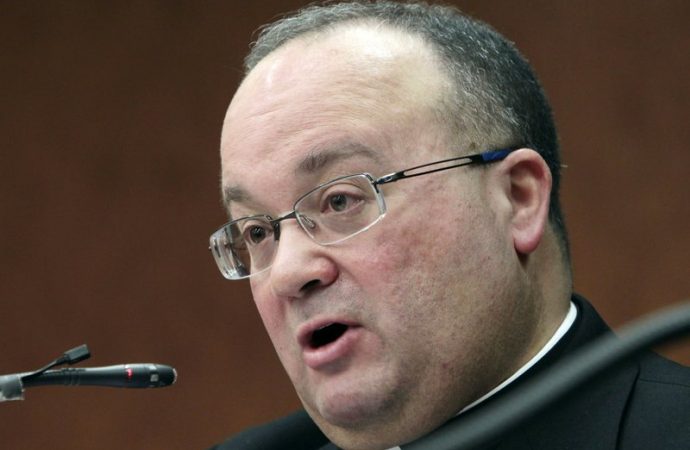Reactions after Pope Francis’s Decision to Send a Top Prosecutor to Chile
By Ines San Martin
Catholics from Chile welcomed Pope Francis’s decision to send a representative to the country to look into the case of Bishop Juan Barros, accused by victims of clerical sexual abuse of covering up the crimes of pedophile priest Fernando Karadima, who the Vatican found guilty of abusing minors in 2011. Barros himself has been quoted saying he welcomes “with faith and joy” whatever the pontiff decides. Chilean Cardinal Ricardo Ezzati also welcomed Francis’s decision to send Archbishop Charles J. Scicluna of Malta to listen to those who’ve “manifested their will to make known elements they possess.” Ezzati called the move “opportune,” and believed that it will lead to a “more complete process.” “We’re very happy with the decision and I think it is very opportune […] he comes, as the pope said, to look for the elements that the people want to offer to him for a more complete process,” said the prelate, Archbishop of Santiago, in a statement made available by Biobiochile. Barros, who together with three other bishops has been accused by the victims of Karadima of covering up for the abuse committed by him, was not in his diocese when the news was announced by the Vatican’s press office on Tuesday. However, through a statement released by his diocese, Osorno, the bishop said that he “welcomes with faith and joy everything the pope decides,” and asked “God for the truth to shine, and invoking especially to the Holy Virgin Mary that everyone reaches peace.” Later that same day, diocesan spokesperson, Jaime Coiro, told reporters that Scicluna’s mission to Chile “demonstrates” that during the pope’s recent visit to Chile he had “an attitude of true listening and closeness to the reality and challenges of Chilean society and of the Church.” Barros, who says he’s innocent and knew nothing of the abuses, was transferred by Francis from the Chilean military diocese to the Diocese of Osorno in 2015, causing uproar. Juan Carlos Claret Pool, spokesman for the lay people of Osorno who oppose Barros’s appointment, told Crux that they were “surprised” by the announcement, and said that they were going to invite Scicluna to Osorno to speak with them too, “because the problem is here.” “For three years, not only the laity but also the clergy of Osorno tried to reach the pope, exhausting every possibility. However, we got the doors shut in our face, this is why we protested during his visit,” Claret said. During the Jan. 15-18 papal visit to Chile, lay men and women of Osorno protested with signs along the routes of the popemobile, in the hopes that Francis would see them. Claret believes that the pope’s decision shows he responds more to “media scandals” than “to the faithful people of God,” and this is not “a good message.” Yet since Karadima’s crimes - and the alleged cover up - have been litigated according to Chilean law, the layman acknowledged that the only route to find the truth about Barros is through a canonical trial, hence they’re going to “trust” Scicluna’s process, but “not blindly.” Francis is on record defending Barros, saying that the accusations against him amount to “calumny.” The pope’s comments came during the last day of his Jan. 15-18 visit to Chile, and were reiterated on the plane back from his Latin American tour, which included a Jan. 18-21 visit to Peru. Speaking with journalists, the pontiff also acknowledged that Barros had presented his resignation twice, and both times it was denied by the Argentine pontiff. Yet according to the Vatican statement released on Tuesday, “some recent affirmations” led to his decision to send Scicluna to investigate further. Beyond Chile, among those who reacted publicly to Francis’s decision is abuse survivor Marie Collins, who sat on the pope’s Commission for the Protection of Minors, but resigned in early 2017 due to frustrations with the Roman curia - meaning, the Church’s government in Rome. “It’s a pity the Pope did not do this before making his recent comments. However it is good he has now looked anew and taken this step,” Collins said, in response to questions posed to her in her Twitter feed. “Archbishop Scicluna has a positive record on abuse and hopefully will be enabled to do a thorough investigation.” In a second message, Collins said she hoped Scicluna will talk to “the Karadima survivors still in Chile and Juan Carlos Cruz, who lives and works in the USA.” Scicluna is a former top prosecutor for sexual abuse crimes in the Church under Pope emeritus Benedict XVI, whose most celebrated prosecution involved the late Mexican Father Marcial Maciel Degollado, founder of the Legion of Christ, who was found guilty in 2006 and sentenced to a life of “prayer and penance.” He currently serves as president of the Vatican’s doctrinal team dealing with appeals filed by clergy accused of abuse.
|
.
Any original material on these pages is copyright © BishopAccountability.org 2004. Reproduce freely with attribution.
